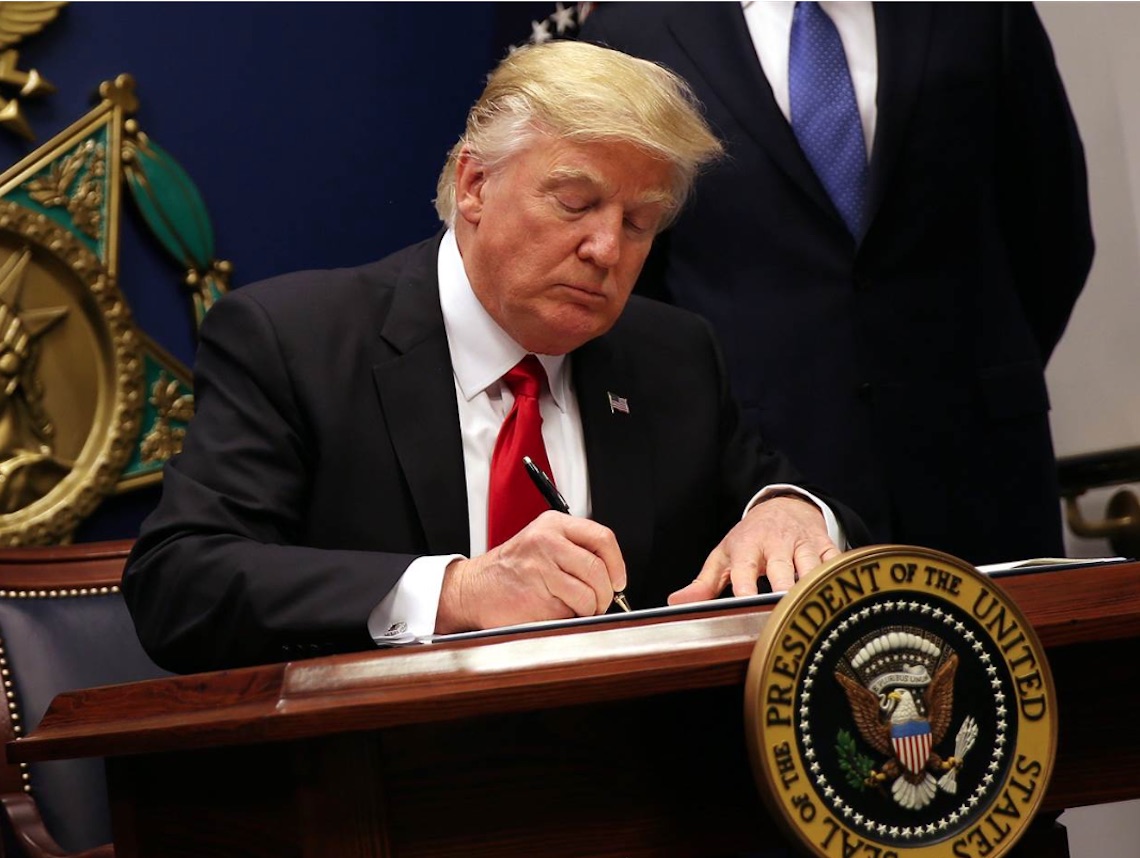 President Donald Trump signs an executive order restricting immigration. Photo by Carlos Barria/Reuters
President Donald Trump signs an executive order restricting immigration. Photo by Carlos Barria/Reuters A Los Angeles-based coalition of more than 1,800 self-identified Jews launched this week by releasing a statement that responds to executive actions on immigration and refugees and affirms a commitment to Jewish and American values.
“Frankly, I’ve never seen in my life in L.A. a coalition this broad, that’s come together for this single purpose,” said former L.A. County Supervisor Zev Yaroslavsky, one of six members of the organizing committee at the helm of the new group calling itself Jews United for Democracy and Justice (JUDJ).
The other committee members are former L.A. Congressman Mel Levine, civics scholar and social entrepreneur Shawn Landres, UCLA Jewish history professor David Myers, political consultant Dan Loeterman and attorney Janice Kamenir-Reznik.
On Feb. 28, the six organizers sat down over breakfast in Myers’ Pico-Robertson home, the coalition’s impromptu command center, to explain the group’s goals to a reporter.
“We’re not aspiring to be another Jewish organization in the alphabet soup of Jewish organizations. … We certainly imagine ourselves not displacing, but working alongside other organizations that are engaged in the same kind of work,” Myers said.
The group’s statement of principles doesn’t mention President Donald Trump by name, but addresses a perceived threat to democratic institutions posed by his administration.
“JUDJ is deeply concerned about rising threats to religious tolerance, equal rights, a free and fair press, human dignity, and long-held norms of decency and civil society,” the statement reads. “We will speak out and take action when our shared Jewish values require us to counter those threats.”
It lays out, in broad strokes, values it sees as threatened by the executive branch, including “America is a nation of laws” and “America is a nation of immigrants.”
“There’s an almost daily assault on one or another foundation of our democratic tradition — kind of aerial bombardment,” Myers said. “And I think what we’re saying is that in the midst of the confusion that is sown, we want to be a voice of clarity.”
The coalition came together after a Feb. 5 meeting of Jewish leaders in Myers’ living room, called in response to a Jan. 27 executive order by Trump that restricted admissions of refugees to the United States. After that meeting, members formed five working groups: immigration, long-term strategy, coalition building, lawyers and rabbis.
The statement of principles, first circulated widely on Feb. 24, represents the coalition’s public debut. By Feb. 28, the list of signatories included more than 110 clergy members, 55 current and former elected officials and 270 board officers and senior executives of Jewish communal groups and philanthropies.
The list incorporated members of the board of The Jewish Federation of Greater Los Angeles and the Jewish Community Foundation of Los Angeles, as well as other Jewish membership organizations; elected officials in Sacramento and Washington, D.C.; all three citywide elected officials in Los Angeles, City Attorney Mike Feuer, Controller Ron Galperin and Mayor Eric Garcetti; philanthropists; university professors; and clergy from every major denomination.
The move to establish a new coalition comes as some members of the Jewish community see a lack of organized leadership opposed to Trump’s actions. After Federation President and CEO Jay Sanderson sent a community-wide email that addressed the refugee order without denouncing it, for instance, alumni of Federation’s Rautenberg New Leaders Project wrote a letter expressing their disappointment and requesting that he take a stronger stance.
But members of the JUDJ organizing committee insisted the group wouldn’t compete with Federation or any other Jewish organization, but rather lend political capital to groups that can use it.
“We are not in competition with anybody else,” Levine said. “We’re inclusive and draw people from all of these organizations.”
Levine said one of the primary purposes of the coalition would be to support and join with communities targeted by the administration, naming in particular the Muslim and Hispanic communities. But it also seeks to unite Jews across political and demographic lines in support of democratic values.
“A lot of people in my generation weren’t around for the fights that Zev was around for,” said Loeterman, who is 28. “We weren’t around for the fights that David and Janice and Shawn and Mel were around for. … They see this as kind of our generation’s chance to join with other generations.”





















 More news and opinions than at a Shabbat dinner, right in your inbox.
More news and opinions than at a Shabbat dinner, right in your inbox.